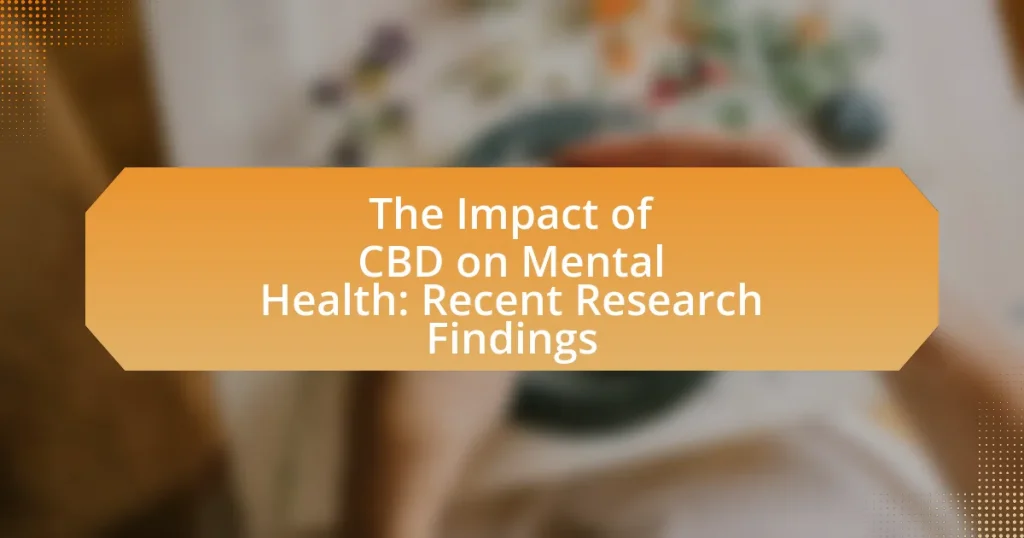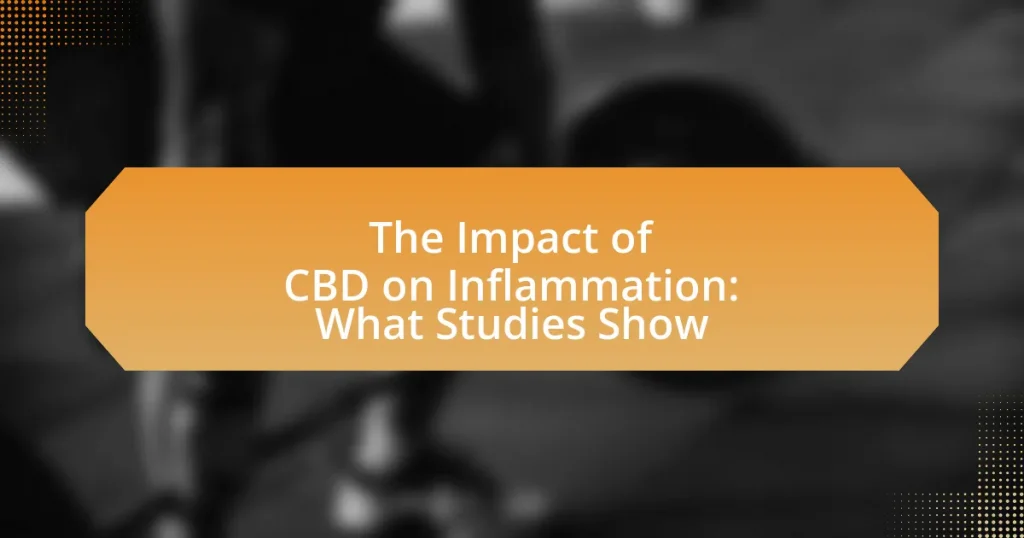The article examines the impact of CBD on mental health, highlighting its potential benefits in reducing symptoms of anxiety, depression, and PTSD. It discusses how CBD interacts with the endocannabinoid system and key neurotransmitters, particularly serotonin, to influence mood and emotional responses. Recent research findings indicate that CBD may serve as an effective treatment option for various mental health conditions, supported by clinical trials demonstrating its anxiolytic and antidepressant-like effects. The article also addresses demographic variations in response to CBD, the integration of CBD into existing treatment plans, and future research directions to further understand its therapeutic potential.
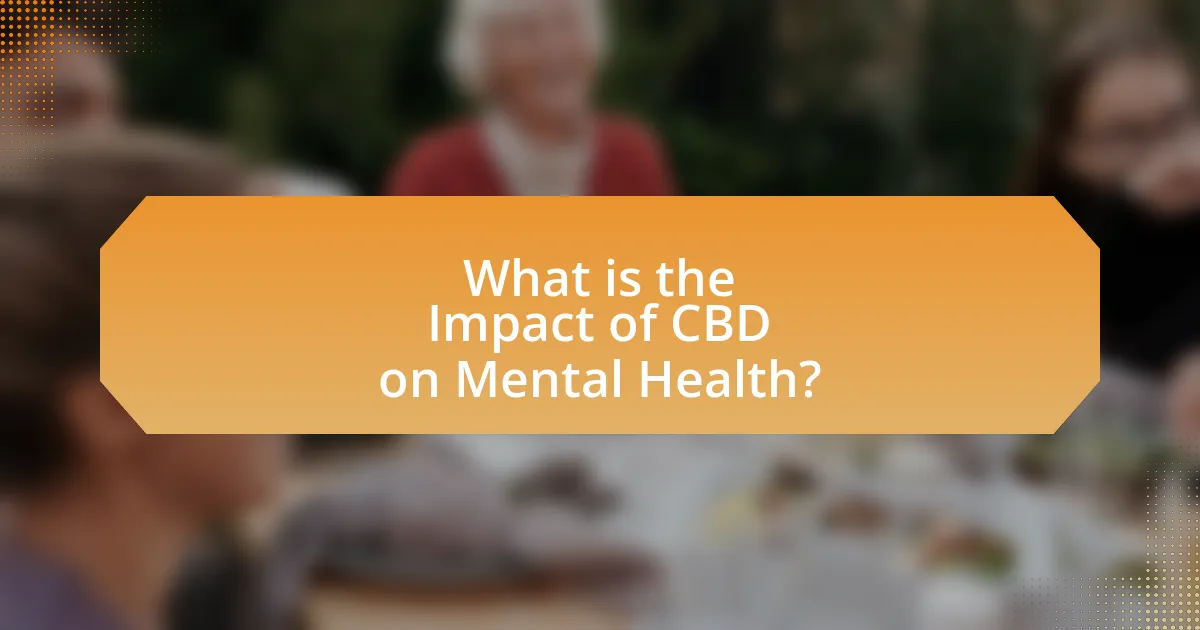
What is the Impact of CBD on Mental Health?
CBD has been shown to have a positive impact on mental health, particularly in reducing symptoms of anxiety and depression. Research indicates that CBD interacts with the endocannabinoid system, which plays a crucial role in regulating mood and emotional responses. A study published in the Journal of Psychopharmacology found that CBD significantly reduced anxiety in participants during a public speaking test, demonstrating its potential as an anxiolytic agent. Additionally, a review in the journal Neurotherapeutics highlighted that CBD may help alleviate symptoms of PTSD and improve sleep quality, further supporting its therapeutic benefits for mental health.
How does CBD interact with the brain to influence mental health?
CBD interacts with the brain primarily by influencing the endocannabinoid system, which plays a crucial role in regulating mood, anxiety, and stress responses. This interaction occurs through the modulation of neurotransmitter release, particularly serotonin, which is linked to feelings of well-being and happiness. Research indicates that CBD can enhance serotonin signaling by inhibiting the reuptake of this neurotransmitter, thereby potentially alleviating symptoms of anxiety and depression. A study published in the journal Neurotherapeutics in 2015 highlighted that CBD has anxiolytic effects, suggesting its potential as a treatment for anxiety disorders. Additionally, CBD’s anti-inflammatory properties may contribute to its positive effects on mental health by reducing neuroinflammation, which has been associated with various psychiatric conditions.
What are the key receptors involved in CBD’s effects on mental health?
The key receptors involved in CBD’s effects on mental health are the cannabinoid receptors CB1 and CB2, as well as serotonin receptors, particularly the 5-HT1A receptor. CBD interacts with these receptors to modulate neurotransmitter release and influence mood and anxiety levels. Research indicates that CBD’s activation of the 5-HT1A receptor can lead to anxiolytic effects, which has been supported by studies showing reduced anxiety in animal models when CBD is administered. Additionally, CBD’s interaction with CB1 and CB2 receptors contributes to its potential therapeutic effects on various mental health disorders, including depression and anxiety.
How does CBD affect neurotransmitter levels related to mood and anxiety?
CBD affects neurotransmitter levels related to mood and anxiety by modulating the endocannabinoid system, which plays a crucial role in regulating these neurotransmitters. Specifically, CBD has been shown to increase serotonin levels, a neurotransmitter directly linked to mood regulation, thereby potentially alleviating symptoms of anxiety and depression. Research published in the journal “Neurotherapeutics” indicates that CBD enhances the signaling of serotonin receptors, particularly the 5-HT1A receptor, which is associated with anxiolytic effects. Additionally, CBD may influence the levels of other neurotransmitters such as GABA and glutamate, contributing to its calming effects. These mechanisms suggest that CBD can positively impact mood and anxiety through its interaction with neurotransmitter systems.
What mental health conditions are being studied in relation to CBD?
Research is currently focusing on several mental health conditions in relation to CBD, including anxiety disorders, depression, post-traumatic stress disorder (PTSD), and schizophrenia. Studies have indicated that CBD may help reduce anxiety levels, as evidenced by a 2019 review published in the journal “Frontiers in Psychology,” which highlighted CBD’s potential anxiolytic effects. Additionally, research published in “Neuropsychopharmacology” in 2020 found that CBD could have antidepressant-like effects in animal models. Furthermore, a study in “The Journal of Psychopharmacology” in 2021 suggested that CBD may alleviate symptoms of PTSD. Lastly, preliminary research has indicated that CBD might have antipsychotic properties, which could be beneficial for individuals with schizophrenia, as noted in a 2022 study in “Translational Psychiatry.”
How effective is CBD in treating anxiety disorders?
CBD is effective in treating anxiety disorders, as evidenced by various studies demonstrating its anxiolytic properties. Research published in the journal Neurotherapeutics indicates that CBD can reduce anxiety in both animal and human studies, with a notable study showing that 79% of participants experienced a decrease in anxiety levels after using CBD. Additionally, a review in the Journal of Psychopharmacology found that CBD significantly reduced anxiety in individuals with social anxiety disorder during public speaking tasks. These findings support the conclusion that CBD may be a beneficial treatment option for anxiety disorders.
What does recent research say about CBD’s impact on depression?
Recent research indicates that CBD may have a positive impact on depression. A study published in the journal “Neurotherapeutics” in 2020 found that CBD exhibited antidepressant-like effects in animal models, suggesting its potential as a treatment for depression. Additionally, a clinical trial conducted by the University of São Paulo in 2019 demonstrated that CBD significantly reduced anxiety and depressive symptoms in patients with social anxiety disorder. These findings support the notion that CBD could be a viable option for managing depression, although further research is needed to fully understand its efficacy and mechanisms.
Can CBD help with PTSD symptoms?
CBD can help alleviate PTSD symptoms. Research indicates that CBD may reduce anxiety, improve sleep, and decrease the frequency of nightmares associated with PTSD. A study published in the Journal of Psychopharmacology in 2019 found that CBD significantly reduced anxiety in participants with social anxiety disorder, which is often comorbid with PTSD. Additionally, a review in the journal Frontiers in Psychology in 2020 highlighted that CBD has potential therapeutic effects on anxiety and stress-related disorders, including PTSD. These findings support the notion that CBD may be beneficial for individuals experiencing PTSD symptoms.
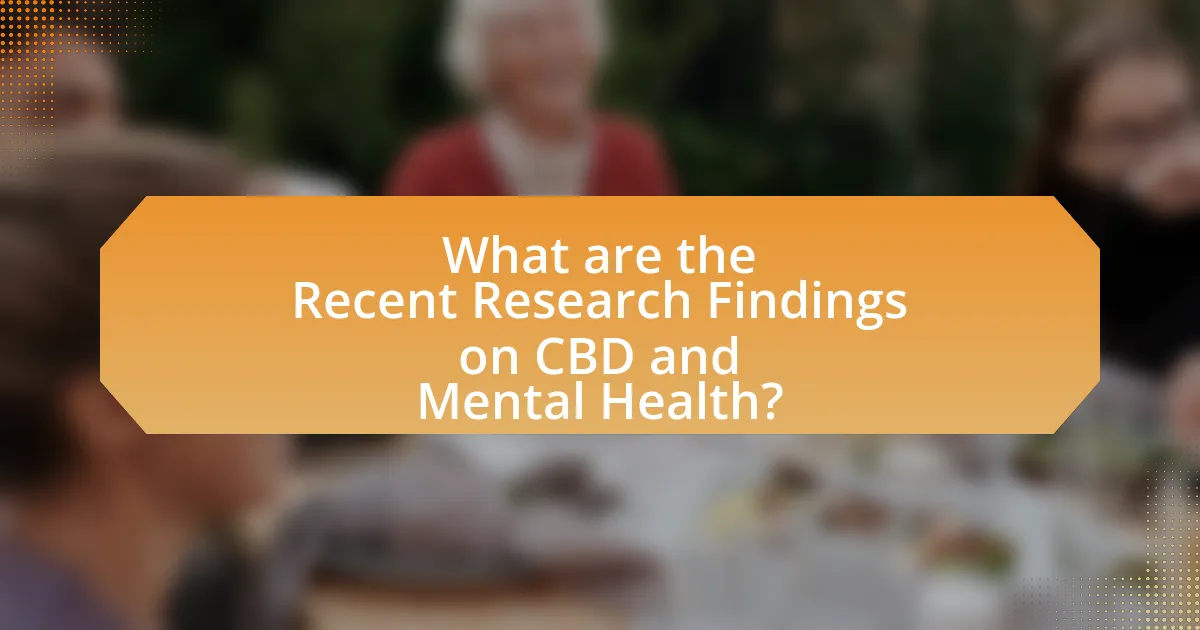
What are the Recent Research Findings on CBD and Mental Health?
Recent research findings indicate that CBD may have a positive impact on mental health, particularly in reducing anxiety and improving sleep quality. A study published in the Journal of Clinical Psychology in 2020 found that CBD significantly reduced anxiety levels in participants with social anxiety disorder during public speaking tasks. Additionally, a 2021 review in the journal Frontiers in Psychology highlighted that CBD has potential therapeutic effects for conditions such as PTSD and generalized anxiety disorder, with many participants reporting decreased symptoms. These findings suggest that CBD could be a promising alternative treatment for various mental health issues, supported by clinical evidence demonstrating its efficacy in managing anxiety-related symptoms.
What studies have been conducted on CBD’s effects on mental health?
Numerous studies have investigated CBD’s effects on mental health, revealing potential benefits for conditions such as anxiety, depression, and PTSD. A notable study published in the Journal of Psychopharmacology by Blessing et al. (2015) reviewed existing research and concluded that CBD may reduce anxiety in both human and animal studies. Another significant study conducted by Crippa et al. (2011) demonstrated that CBD could decrease anxiety and improve cognitive function in individuals with social anxiety disorder during public speaking tasks. Additionally, a 2019 study in the Journal of Clinical Psychology by Shannon et al. found that CBD oil significantly reduced anxiety levels in a sample of patients with anxiety disorders. These studies collectively support the hypothesis that CBD may have therapeutic effects on mental health conditions.
What methodologies are commonly used in CBD mental health research?
Common methodologies used in CBD mental health research include randomized controlled trials (RCTs), observational studies, and meta-analyses. RCTs are considered the gold standard for assessing the efficacy of CBD in treating mental health conditions, as they minimize bias and allow for causal inferences. Observational studies provide real-world insights into the effects of CBD on mental health by analyzing data from users in natural settings. Meta-analyses synthesize findings from multiple studies to provide a comprehensive overview of the evidence regarding CBD’s impact on mental health, enhancing the reliability of conclusions drawn from individual studies. These methodologies collectively contribute to a robust understanding of CBD’s therapeutic potential in mental health contexts.
What are the key findings from recent clinical trials involving CBD?
Recent clinical trials involving CBD have shown promising results in reducing anxiety and improving sleep quality. For instance, a study published in the Journal of Clinical Psychology in 2020 found that CBD significantly decreased anxiety levels in participants with social anxiety disorder, with 79% reporting reduced anxiety after treatment. Additionally, a 2021 trial in the Journal of Psychopharmacology indicated that CBD improved sleep quality in individuals with insomnia, with 66.7% of participants experiencing better sleep after using CBD. These findings suggest that CBD may be an effective therapeutic option for managing anxiety and sleep disorders.
How do the findings vary across different demographics?
Findings on the impact of CBD on mental health vary significantly across different demographics, particularly in age, gender, and socioeconomic status. For instance, research indicates that younger adults, particularly those aged 18-24, report higher levels of anxiety relief from CBD compared to older adults, who may experience less pronounced effects. Additionally, studies show that women tend to report more significant improvements in mood and anxiety symptoms when using CBD than men, suggesting a gender-based difference in response. Furthermore, individuals from lower socioeconomic backgrounds often report higher levels of stress and anxiety, and they may benefit more from CBD interventions, as indicated by a study published in the Journal of Psychopharmacology, which found that lower-income participants experienced greater reductions in anxiety symptoms. These demographic variations highlight the necessity for tailored approaches in CBD research and application.
What differences have been observed in CBD’s effects on various age groups?
CBD’s effects vary significantly across different age groups, with children and older adults showing distinct responses compared to younger adults. Research indicates that children may experience heightened anxiolytic effects, particularly in cases of epilepsy, as evidenced by the FDA’s approval of Epidiolex for treating seizures associated with Dravet syndrome and Lennox-Gastaut syndrome in pediatric patients. In contrast, older adults often report improved sleep quality and reduced anxiety, as highlighted in a study published in the Journal of Clinical Psychology, which found that CBD improved sleep disturbances in older populations. Younger adults, however, may experience a more complex interaction with CBD, where effects can range from anxiety reduction to potential increases in anxiety at higher doses, as noted in a study from the University of Sydney. These differences underscore the importance of age-specific considerations in CBD research and application.
How does gender influence the response to CBD in mental health treatments?
Gender significantly influences the response to CBD in mental health treatments, with research indicating that biological differences, hormonal variations, and psychosocial factors contribute to differing effects. For instance, studies have shown that women may experience more pronounced anxiolytic effects from CBD compared to men, potentially due to hormonal fluctuations that affect cannabinoid receptors. Additionally, a review published in the journal “Frontiers in Pharmacology” highlights that women often report higher levels of anxiety and depression, which may lead to a greater therapeutic response to CBD. This evidence underscores the importance of considering gender as a critical factor in the efficacy of CBD for mental health treatments.
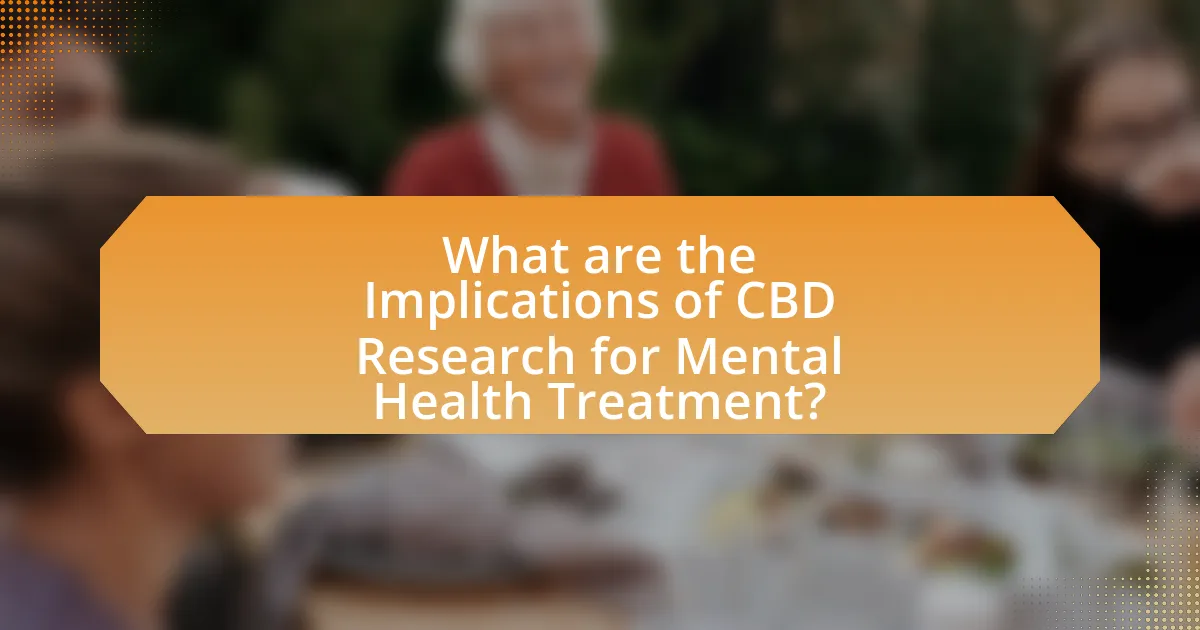
What are the Implications of CBD Research for Mental Health Treatment?
CBD research has significant implications for mental health treatment, particularly in addressing conditions such as anxiety, depression, and PTSD. Studies indicate that CBD may reduce anxiety levels by interacting with serotonin receptors in the brain, which are crucial for mood regulation. For instance, a 2019 study published in “The Journal of Clinical Psychology” found that CBD significantly decreased anxiety in participants with social anxiety disorder during public speaking tasks. Furthermore, research published in “Neurotherapeutics” in 2020 highlighted CBD’s potential in alleviating symptoms of PTSD, suggesting that it may help in reducing the frequency of traumatic memories. These findings underscore the potential of CBD as a therapeutic agent in mental health, warranting further exploration and clinical trials to establish its efficacy and safety in broader populations.
How can CBD be integrated into existing mental health treatment plans?
CBD can be integrated into existing mental health treatment plans by incorporating it as an adjunct therapy alongside traditional treatments such as psychotherapy and medication. Research indicates that CBD may help alleviate symptoms of anxiety and depression, with a study published in the Journal of Psychopharmacology showing that CBD significantly reduced anxiety in participants during public speaking tasks. This suggests that healthcare providers can consider CBD as a complementary option for patients who do not respond adequately to conventional treatments or experience side effects. Additionally, ongoing monitoring and adjustment of treatment plans can ensure that CBD is effectively tailored to individual patient needs, enhancing overall mental health outcomes.
What are the potential benefits of combining CBD with traditional therapies?
Combining CBD with traditional therapies can enhance treatment outcomes for various mental health conditions. Research indicates that CBD may reduce anxiety and improve mood, potentially complementing therapies such as cognitive behavioral therapy (CBT) and medication. A study published in the Journal of Psychopharmacology found that CBD significantly reduced anxiety in participants during public speaking tasks, suggesting its efficacy in managing anxiety disorders when used alongside conventional treatments. Additionally, CBD’s anti-inflammatory properties may support overall mental health by addressing underlying physiological issues, further enhancing the effectiveness of traditional therapies.
What precautions should be taken when using CBD for mental health?
When using CBD for mental health, individuals should consult a healthcare professional to ensure safety and appropriateness for their specific condition. This precaution is crucial because CBD can interact with other medications, potentially altering their effectiveness or causing adverse effects. Research indicates that CBD may influence the metabolism of certain drugs by affecting liver enzymes, which can lead to increased or decreased drug levels in the body. Additionally, individuals should start with a low dose and gradually increase it while monitoring for any side effects, as responses to CBD can vary significantly among users. This approach helps mitigate risks and allows for adjustments based on individual tolerance and therapeutic response.
What are the future directions for CBD research in mental health?
Future directions for CBD research in mental health include exploring its efficacy in treating anxiety disorders, depression, and PTSD. Current studies suggest that CBD may modulate serotonin receptors, which are crucial in mood regulation, indicating potential therapeutic benefits. For instance, a 2020 review published in the Journal of Clinical Psychology highlighted CBD’s anxiolytic effects in animal models and preliminary human trials, suggesting a need for larger, controlled studies to confirm these findings. Additionally, research may focus on understanding the optimal dosages and delivery methods for various mental health conditions, as well as the long-term effects of CBD use.
What unanswered questions remain in the study of CBD and mental health?
Unanswered questions in the study of CBD and mental health include the long-term effects of CBD use, optimal dosages for various mental health conditions, and the mechanisms by which CBD interacts with the brain’s endocannabinoid system. Research has shown that while CBD may have potential benefits for anxiety and depression, the specific pathways and interactions remain unclear, necessitating further investigation. For instance, a study published in the Journal of Psychopharmacology in 2019 highlighted the need for more comprehensive clinical trials to determine effective treatment protocols and understand the pharmacokinetics of CBD in diverse populations.
How might future research shape the understanding of CBD’s role in mental health?
Future research may clarify CBD’s role in mental health by investigating its mechanisms of action, dosage effects, and long-term impacts. Studies have shown that CBD interacts with the endocannabinoid system, which plays a crucial role in regulating mood and anxiety. For instance, a 2020 review published in the journal “Frontiers in Psychology” highlighted that CBD may reduce anxiety and improve sleep, suggesting its potential as a therapeutic agent. Additionally, clinical trials focusing on specific mental health disorders, such as PTSD and depression, could provide more definitive evidence regarding its efficacy and safety. This targeted research will enhance the understanding of how CBD can be integrated into mental health treatment protocols.
What practical tips should individuals consider when using CBD for mental health?
Individuals should consider starting with a low dose of CBD and gradually increasing it to find the optimal amount for their mental health needs. Research indicates that lower doses may be more effective for anxiety relief, as shown in a study published in the Journal of Psychopharmacology, which found that doses between 300 mg and 600 mg significantly reduced anxiety in participants. Additionally, individuals should consult with a healthcare professional before beginning CBD use, especially if they are taking other medications, to avoid potential interactions. It is also advisable to choose high-quality, third-party tested CBD products to ensure safety and efficacy, as the market is saturated with varying product standards. Lastly, maintaining a consistent routine with CBD use can help in monitoring its effects on mental health over time.
